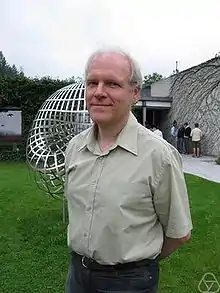Jean-Pierre Demailly
Jean-Pierre Demailly (born 1957) is a French mathematician working in complex analysis and differential geometry.
Jean-Pierre Demailly | |
|---|---|
 Jean-Pierre Demailly in 2008 | |
| Born | 25 September 1957 |
| Nationality | French |
| Alma mater | École Normale Supérieure |
| Awards | Simion Stoilow Prize Stefan Bergman Prize |
| Scientific career | |
| Fields | Mathematics |
| Institutions | Université Grenoble Alpes |
Career
Demailly entered the École Normale Supérieure in 1975. He received his Ph.D. in 1982 under the direction of Henri Skoda at the Pierre and Marie Curie University. He became a professor at Université Grenoble Alpes in 1983.[1]
Demailly's prizes include the Grand Prix Mergier-Bourdeix from the French Academy of Sciences in 1994, the Simion Stoilow Prize from the Romanian Academy of Sciences in 2006, and the Stefan Bergman Prize from the American Mathematical Society in 2015. He became a permanent member of the French Academy of Sciences in 2007.[2] He was an invited speaker at the International Congress of Mathematicians in 1994 and a plenary speaker in 2006.
Research
One main topic of Demailly's research is Pierre Lelong's generalization of the notion of a Kähler form to allow forms with singularities, known as currents. In particular, for a compact complex manifold , an element of the Dolbeault cohomology group is called pseudo-effective if it is represented by a closed positive (1,1)-current (where "positive" means "nonnegative" in this phrase), or big if it is represented by a strictly positive (1,1)-current; these definitions generalize the corresponding notions for holomorphic line bundles on projective varieties. Demailly's regularization theorem says, in particular, that any big class can be represented by a Kähler current with analytic singularities.[3]
Such analytic results have had many applications to algebraic geometry. In particular, Boucksom, Demailly, Pǎun and Peternell showed that a smooth complex projective variety is uniruled if and only if its canonical bundle is not pseudo-effective.[4] Such a relation between rational curves and curvature properties is a central goal of algebraic geometry.
For a singular metric on a line bundle, Nadel, Demailly and Yum-Tong Siu developed the concept of the multiplier ideal, which describes where the metric is most singular. There is an analog of the Kodaira vanishing theorem for such a metric, on compact or noncompact complex manifolds.[5] This led to the first effective criteria for a line bundle on a complex projective variety of any dimension to be very ample, that is, to have enough global sections to give an embedding of into projective space. For example, Demailly showed in 1993 that 2KX + 12nnL is very ample for any ample line bundle L, where addition denotes the tensor product of line bundles. The method has inspired later improvements in the direction of the Fujita conjecture.[6]
Demailly used the technique of jet differentials introduced by Green and Phillip Griffiths to prove Kobayashi hyperbolicity for various projective varieties. For example, Demailly and El Goul showed that a very general complex surface of degree at least 21 in projective space CP3 is hyperbolic; equivalently, every holomorphic map C → X is constant.[7] (The degree bound has been lowered to 18 by Mihai Pǎun.[8]) For any variety of general type, Demailly showed that every holomorphic map C → X satisfies some (in fact, many) algebraic differential equations.[9]
Notes
- Notice biographique de Jean-Pierre Demailly
- "Jean-Pierre Demailly | Liste des membres de l'Académie des sciences / D | Listes par ordre alphabétique | Listes des membres | Membres | Nous connaître". academie-sciences.fr. Retrieved 2017-03-02.
- Demailly (1992); Demailly (2012), Corollary 14.13.
- Boucksom et al. (2013); Lazarsfeld (2004), Corollary 11.4.20.
- Lazarsfeld (2004), Ch. 9; Demailly (2012), Theorem 5.11.
- Demailly (2012), Theorem 7.4.
- Demailly & El Goul (2000).
- Pǎun (2008).
- Demailly (2011); Demailly (2012), Theorem 9.5.
References
- Boucksom, Sébastien; Demailly, Jean-Pierre; Păun, Mihai; Peternell, Thomas (2013), "The pseudo-effective cone of a compact Kähler manifold and varieties of negative Kodaira dimension", Journal of Algebraic Geometry, 22 (2): 201–248, arXiv:math/0405285, doi:10.1090/S1056-3911-2012-00574-8, MR 3019449, S2CID 15197055
- Demailly, Jean-Pierre (1992), "Regularization of closed positive currents and intersection theory" (PDF), Journal of Algebraic Geometry, 1: 361–409, MR 1158622
- Demailly, Jean-Pierre; El Goul, Jawher (2000), "Hyperbolicity of generic surfaces of high degree in projective 3-space", American Journal of Mathematics, 122 (3): 515–546, arXiv:math/9804129, doi:10.1353/ajm.2000.0019, MR 1759887, S2CID 14166985
- Demailly, Jean-Pierre (2011), "Holomorphic Morse inequalities and the Green–Griffiths–Lang conjecture", Pure and Applied Mathematics Quarterly, 7 (4): 1165–1207, arXiv:1011.3636, doi:10.4310/PAMQ.2011.v7.n4.a6, MR 2918158, S2CID 16065414
- Demailly, Jean-Pierre (2012), Analytic Methods in Algebraic Geometry (PDF), International Press, ISBN 978-1-57146-234-3, MR 2978333
- Lazarsfeld, Robert (2004), Positivity in Algebraic Geometry (2 vols.), Springer Nature, ISBN 978-3-540-22533-1, MR 2095471
- Păun, Mihai (2008), "Vector fields on the total space of hypersurfaces in the projective space and hyperbolicity", Mathematische Annalen, 340 (4): 875–892, doi:10.1007/s00208-007-0172-5, MR 2372741, S2CID 123551935
External links
- Personal page at Grenoble, including publications
- Demailly, Jean-Pierre, Complex Analytic and Differential Geometry (PDF) (OpenContent book)
